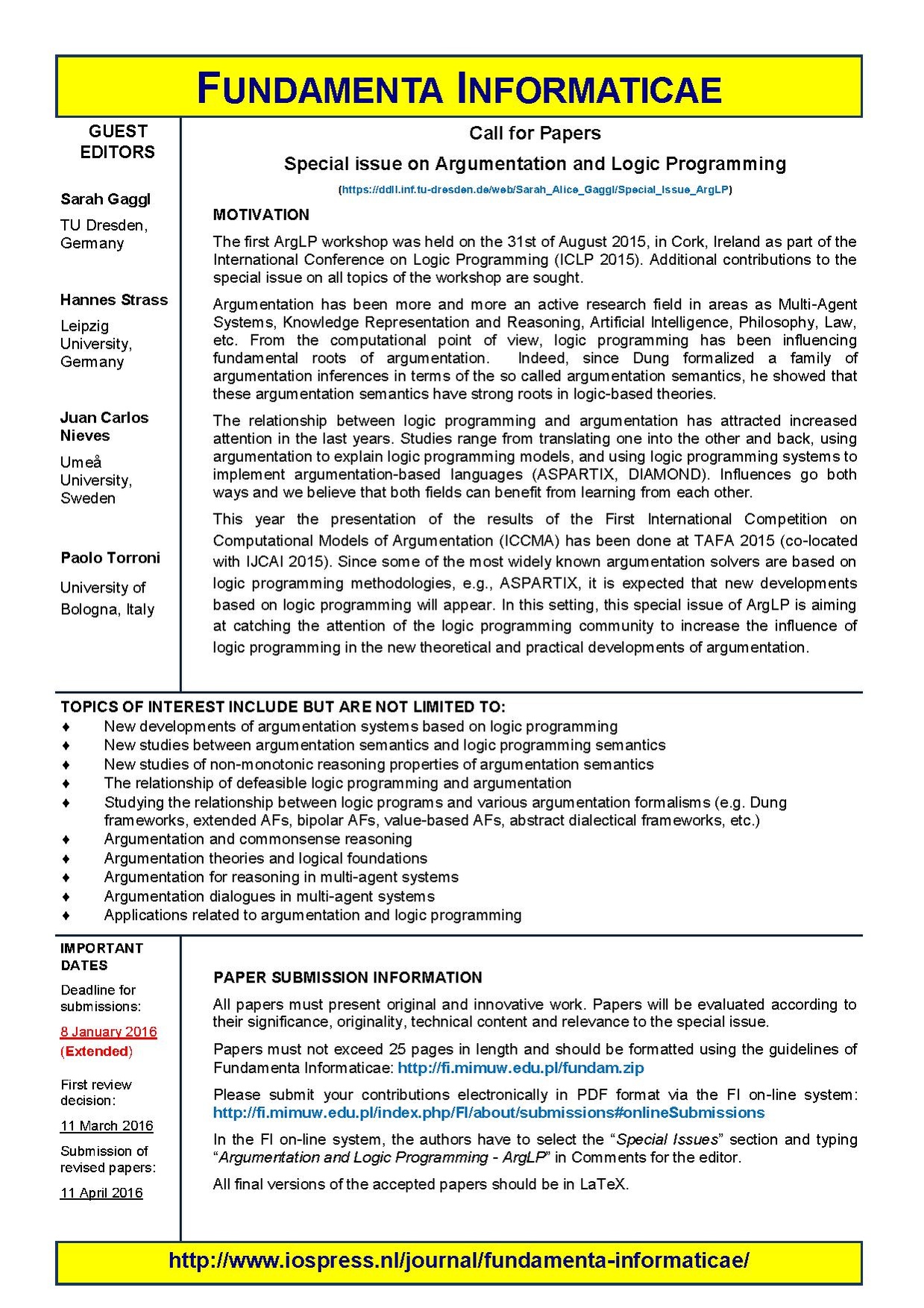Special Issue ArgLP 2016
Call for Papers: Special issue on Argumentation and Logic Programming of Fundamenta Informaticae (http://www.iospress.nl/journal/fundamenta-informaticae/)
The first ArgLP workshop was held on the 31st of August 2015, in Cork, Ireland as part of the International Conference on Logic Programming (ICLP 2015).
Additional contributions to the special issue on all topics of the workshop are sought.
MOTIVATION
Argumentation has been more and more an active research field in areas as Multi-Agent Systems, Knowledge Representation and Reasoning, Artificial Intelligence, Philosophy, Law, etc. From the computational point of view, logic programming has been influencing fundamental roots of argumentation. Indeed, since Dung formalized a family of argumentation inferences in terms of the so called argumentation semantics, he showed that these argumentation semantics have strong roots in logic-based theories.
The relationship between logic programming and argumentation has attracted increased attention in the last years. Studies range from translating one into the other and back, using argumentation to explain logic programming models, and using logic programming systems to implement argumentation-based languages (ASPARTIX, DIAMOND). Influences go both ways and we believe that both fields can benefit from learning from each other.
This year the presentation of the results of the First International Competition on Computational Models of Argumentation (ICCMA) has been done at TAFA 2015 (co-located with IJCAI 2015). Since some of the most widely known argumentation solvers are based on logic programming methodologies, e.g., ASPARTIX, it is expected that new developments based on logic programming will appear. In this setting, this special issue of ArgLP is aiming at catching the attention of the logic programming community to increase the influence of logic programming in the new theoretical and practical developments of argumentation.
TOPICS
Topics of interest include but are not limited to:
- New developments of argumentation systems based on logic programming
- New studies between argumentation semantics and logic programming semantics
- New studies of non-monotonic reasoning properties of argumentation semantics
- The relationship of defeasible logic programming and argumentation
- Studying the relationship between logic programs and various argumentation formalisms (e.g. Dung frameworks, extended AFs, bipolar AFs, value-based AFs, abstract dialectical frameworks, etc.)
- Argumentation and commonsense reasoning
- Argumentation theories and logical foundations
- Argumentation for reasoning in multi-agent systems
- Argumentation dialogues in multi-agent systems
- Applications related to argumentation and logic programming
IMPORTANT DATES
Deadline for submissions: 11 December 2015 8 January 2016 (extended)
First review decision: 11 March 2016
Submission of revised papers: 11 April 2016
PAPER SUBMISSION INFORMATION
All papers must present original and innovative work. Papers will be evaluated according to their significance, originality, technical content and relevance to the special issue.
Papers must not exceed 25 pages in length and should be formatted using the guidelines of Fundamenta Informaticae:
http://fi.mimuw.edu.pl/fundam.zip
Please submit your contributions electronically in PDF format via the FI on-line system: http://fi.mimuw.edu.pl/index.php/FI/about/submissions#onlineSubmissions
In the FI on-line system, the authors have to select the “Special Issues” section and typing “Argumentation and Logic Programming - ArgLP” in Comments for the editor.
All final versions of the accepted papers should be in LaTeX.
If you intend to submit a paper for this special issue, please declare your interest by sending a mail to one of the guest editors.
GUEST EDITORS
Sarah Gaggl, TU Dresden, Germany, sarah.gaggl@tu-dresden.de
Hannes Strass, Leipzig University, Germany, strass@informatik.uni-leipzig.de
Juan Carlos Nieves, Umeå University, Sweden, jcnieves@cs.umu.se
Paolo Torroni, University of Bologna, Italy, paolo.torroni@unibo.it
